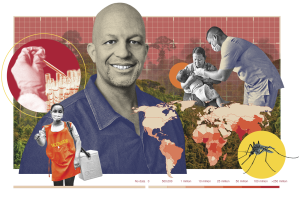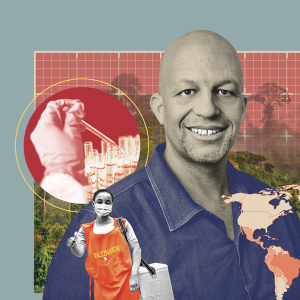Therapeutic Advocate
Spotlight

An eye-opening visit with a patient sparked Dr. Joseph Amprey’s (M.D. ’04, Ph.D. ’02) desire to pursue a career in drug development.
Dr. Amprey was six months into his internship on a grueling late-night shift when he met his patient — a woman in her 40s in the end stages of metastatic breast cancer. “When I walked in, her smile lit up the room,” Dr. Amprey says. “Here was a young mother who was going through something unimaginable. Yet, she was smiling. It gave me perspective, but I also felt helpless.”
The experience prompted Dr. Amprey to shift the focus of his career from traditional clinical practice and immunology research to drug development, in a quest to reach many more patients.
“I ended up consulting for a venture capital firm during my Ph.D., and a light bulb went off because I was exposed to so many different, promising ideas,” Dr. Amprey said. “And that promise was very exciting to me.”
Since then, he has played a key role in the launch of Solosec, a treatment for bacterial vaginosis, and co-founded Zyngenia, a company that develops antibody-based therapeutics for breast cancer and autoimmune diseases.
His latest venture, Zero Point Five Therapeutics, the Baltimore-based company he founded and where he serves as CEO, works to develop safe and effective treatments for neglected tropical diseases (NTDs) common in tropical and subtropical climates in 149 countries. NTDs affect more than 1 billion people, disproportionately impacting those living in poverty.
The company’s current therapeutic target is Soil-transmitted helminthiasis (STH) — a group of intestinal parasites that affects both adults and children. STH can lead to anemia, poor birth outcomes, malnutrition, stunted growth, cognitive defects and intestinal obstructions. Dr. Amprey’s team has developed a child-friendly, single-dose treatment (compared to the traditional six-dose regimen) and will soon begin final studies before submission for FDA approval.
In his career — and in his life — Dr. Amprey has been focused on the fight against systemic inequalities. “When I see diseases that disproportionately and unnecessarily affect certain populations — like women, children or people of color — it tears me up inside,” he says. “I have found myself becoming a social justice advocate for populations affected by these diseases. This work is my way of contributing.”
Fall 2024 Front to Back
-
From the Dean

Message from the Dean
By integrating innovations in artificial intelligence into clinical practice, the aim is to enhance, rather than replace, the personal care that patients value. -
Features

Change of Heart
To tackle long-standing sex disparities in outcomes for cardiac surgery, Weill Cornell Medicine physicians are pursuing innovative clinical trials and treatment -
Features

The Dark Side of STING
Painstaking research has yielded vital new insights on how a protein known for triggering inflammation can both hinder — and accelerate — cancer -
Features

Teaching Empathy in the Digital Age
Meet C.A.R.L., a lifelike virtual “patient” who stands at the vanguard of advances in immersive learning that could improve the way doctors are trained. -
Notable

New Chair and Physician-in-Chief
Dr. Myles Wolf, who specializes in nephrology, will oversee Weill Cornell Medicine's largest clinical and academic department. -
Notable

Dateline
Dr. Sasha Fahme is leading studies to better understand the sexual health challenges refugee women face. -
Notable

Overheard
Weill Cornell Medicine faculty members are leading the conversation about important health issues across the country and around the world. -
Notable

News Briefs
Notable faculty appointments, honors, awards and more — from around campus and beyond. -
Grand Rounds

Lending an Ear
How a single-sided cochlear implant is helping a psychiatry resident achieve his dreams. -
Grand Rounds

The Art of Medicine
Through visits to the Guggenheim and more, medical students are expanding their thinking to improve patient-centered care. -
Grand Rounds

News Briefs
The latest on teaching, learning and patient-centered care. -
Discovery

Unraveling the Riddle of Suicide Risk
Researchers are identifying new preventive strategies by leveraging cutting-edge computational techniques and cross-disciplinary strategies. -
Discovery

A Common Type of Fiber May Trigger Bowel Inflammation
An unexpected finding could pave the way for therapeutic diets that ease symptoms and promote gut health. -
Discovery

Findings
The latest advances in faculty research, published in the world’s leading journals. -
Alumni

Profiles
From leading the Alumni Association to improving public communication of science, our alumni are making an impact. -
Alumni

Notes
What’s new with you?
Keep your classmates up to date on all your latest achievements with an Alumni Note. -
Alumni

In Memoriam
Marking the passing of our faculty and alumni.
-
Alumni

Moments
Marking celebratory events in the lives of our students and alumni, including the White Coat Ceremony and Reunion. -
Second Opinion

Taming Weed
How can medicine and public health address largely unregulated, readily available and potentially harmful marijuana products? -
Exchange

Roles in Research
A physician-scientist and a college student discuss how undergraduate research opportunities can boost the STEM pipeline of those from historically underrepresented communities. -
Muse

Making the Music
Clinical psychologist Dr. Robert Allan finds inspiration from composing and playing the piano. -
Spotlight

Therapeutic Advocate
In his quest to help more patients, Dr. Joseph Amprey (M.D. ‘04, Ph.D. ‘02) shifted from clinical practice to drug development.